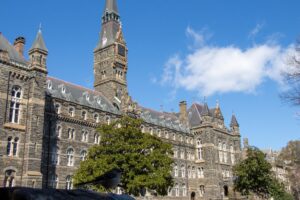On Sept. 12, Sens. Ted Cruz (R-TX) and Marsha Blackburn (R-TN) introduced a bill to repeal the existing COVID-19 vaccine mandate for students aged 12-15 currently attending D.C. public schools (DCPS).
This bill aims to repeal a 2021 act passed by the D.C. Council, which added the COVID-19 vaccine to the list of required vaccines for DCPS students over the age of 12. Currently, as per DCPS guidelines, all students over the age of 12 are required to be vaccinated against COVID-19. The Sept. 12 bill would prevent federal and local funds from being used to impose or enforce such a mandate.
In a Sept. 12 press release following the introduction of the bill, Cruz argued that the current DCPS vaccine mandate is racist, citing the lower vaccination rates in Black students. Senators in support of the bill argued that continuation of the current DCPS mandate would keep more minority students out of school.
“D.C. public schools are blatantly discriminating against Black students in our nation’s capital. The rate of vaccination for Black students between the ages of 12 and 15 in Washington, D.C. is 60 percent—far lower than the city average,” Cruz’s press release reads.
In comparison, 90 percent of white children in the same age bracket are vaccinated against COVID-19. Some of the disparity can be attributed to Black communities being historically excluded from access to medical care, as well as their distrust towards the health care system after a long history of exploitation. Today, Black patients are often undertreated for pain, misdiagnosed at high rates for mental health disorders, and have higher infant mortality rates than white newborns.
According to the DCist, Deputy Mayor for Education Paul Kihn announced that enforcement of the 2021 vaccine mandate would be delayed until Jan. 3, 2023 to allow students to catch up on their vaccines. D.C. Health currently offers free COVID-19 vaccines and boosters at sites across all eight wards, no appointment needed.
“D.C. schools has already postponed enforcement of this racist policy until 2023 and they should simply scrap it. Until they do, I will fight for the students of D.C. and work to end this mandate,” Cruz wrote.
Progressives in D.C. have pushed back on the bill and the Republican’s rationale as a proxy for the Republican political agenda. Opponents of the Republican bill, instead, are calling for D.C. statehood as well as more effective and well-intentioned reform to protect Black students in D.C.
“This is Cruz’s fourth attack this Congress on D.C.’s COVID-19 vaccine mandate for students,” Congresswoman Eleanor Norton (D-VA) said in a Sept. 13 press release. Cruz’s proposed bill, according to Norton, is yet another attempt by Republicans to repeal the COVID-19 vaccine mandate and to interfere in D.C.’s local affairs.
Norton condemned Cruz’s repeated attempts to use the federal government’s power to dictate local D.C. policies and to violate D.C. home rule. “D.C.’s duly elected local government adopted the COVID-19 vaccine mandate for students, and Senator Cruz does not have the right to interfere in this policy decision,” Norton wrote.
D.C. governance is set up according to the D.C. Home Rule Act of 1973, which grants local government limited autonomy, but no voting representation in the federal government. Additionally, the District Council and the D.C. mayor are both unable to pass legislation without congressional approval.
Mia Young (NHS ’23), the director of programming for the Georgetown Students for D.C. Statehood, shared her frustration with the Senate bill. “It’s so infuriating. As a D.C. resident, the idea that people I didn’t have a say in voting for could swoop in and change a local policy just to push their own political agenda makes me extremely angry,” she wrote in an email to the Voice.
Young sees the Sept. 12 bill as having serious implications for D.C. local autonomy, echoing Norton’s frustration with Cruz’s repeated attempts to repeal the vaccine-mandate.
“This issue has everything to do with D.C. statehood,” Young wrote. “There is nowhere else in the country where the Senate could infringe on a school district’s policy about vaccines, masks, or pretty much anything else.”
Young cited vaccine equity among white and Black communities as problematic, but sees the proposed Republican bill as being counterproductive to increased vaccine distribution or access to medical care and being made in bad faith. “Republicans are the ones making [existing disparities] worse by standing in the way of healthcare reforms and spreading misinformation,” she wrote.
Young also argues the hypocrisy of the bill in that [Republican politicians preach about local and state autonomy but are interfering in legislation passed by local D.C. government].
She sees this bill as highlighting the need for Georgetown’s student body to educate themselves and raise their voices about issues of representation and statehood.
“As Georgetown students, we live, go to school, and work in a city where our neighbors are denied fundamental rights. At a school that is so politically conscious, that is something we should care about,” Young wrote. “Because of D.C.’s lack of representation, D.C. statehood can’t happen unless people from outside the city start caring about and advocating for it.”





